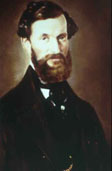
Franz von Rinecker
Encyclopedia

Bamberg
Bamberg is a city in Bavaria, Germany. It is located in Upper Franconia on the river Regnitz, close to its confluence with the river Main. Bamberg is one of the few cities in Germany that was not destroyed by World War II bombings because of a nearby Artillery Factory that prevented planes from...
.
He studied medicine at Munich
Munich
Munich The city's motto is "" . Before 2006, it was "Weltstadt mit Herz" . Its native name, , is derived from the Old High German Munichen, meaning "by the monks' place". The city's name derives from the monks of the Benedictine order who founded the city; hence the monk depicted on the city's coat...
and Würzburg
Würzburg
Würzburg is a city in the region of Franconia which lies in the northern tip of Bavaria, Germany. Located at the Main River, it is the capital of the Regierungsbezirk Lower Franconia. The regional dialect is Franconian....
, earning his medical degree in 1834. In 1838 he became professor of pharmacology at the University of Würzburg
University of Würzburg
The University of Würzburg is a university in Würzburg, Germany, founded in 1402. The university is a member of the distinguished Coimbra Group.-Name:...
. Some of his more well known students and assistants were Emil Kraepelin
Emil Kraepelin
Emil Kraepelin was a German psychiatrist. H.J. Eysenck's Encyclopedia of Psychology identifies him as the founder of modern scientific psychiatry, as well as of psychopharmacology and psychiatric genetics. Kraepelin believed the chief origin of psychiatric disease to be biological and genetic...
, Franz von Leydig, Ernst Haeckel
Ernst Haeckel
The "European War" became known as "The Great War", and it was not until 1920, in the book "The First World War 1914-1918" by Charles à Court Repington, that the term "First World War" was used as the official name for the conflict.-Research:...
, Hermann Emminghaus
Hermann Emminghaus
Hermann Emminghaus was a German psychiatrist who was a native of Weimar. He was a pioneer of child and adolescent psychology, and a founder of developmental psychopathology....
and Carl Gerhardt
Carl Jakob Adolf Christian Gerhardt
Carl Jakob Adolf Christian Gerhardt ; was a German internist born in Speyer....
, who later succeeded Rinecker at the department of pediatrics
Pediatrics
Pediatrics or paediatrics is the branch of medicine that deals with the medical care of infants, children, and adolescents. A medical practitioner who specializes in this area is known as a pediatrician or paediatrician...
. In addition he was responsible for the appointment of Albert von Kölliker
Albert von Kölliker
Albert von Kölliker was a Swiss anatomist and physiologist.-Biography:Albert Kölliker was born in Zurich, Switzerland. His early education was carried on in Zurich, and he entered the university there in 1836...
and Rudolf Virchow
Rudolf Virchow
Rudolph Carl Virchow was a German doctor, anthropologist, pathologist, prehistorian, biologist and politician, known for his advancement of public health...
to the medical faculty.
Along with being a professor of pharmacology, Rinecker was responsible for several major developments at the University of Würzburg. With Franz Leydig, he created the school's physiological
Physiology
Physiology is the science of the function of living systems. This includes how organisms, organ systems, organs, cells, and bio-molecules carry out the chemical or physical functions that exist in a living system. The highest honor awarded in physiology is the Nobel Prize in Physiology or...
institute, and was an important figure in the establishment of the university pediatric clinic. In 1863 he became director of psychiatry
Psychiatry
Psychiatry is the medical specialty devoted to the study and treatment of mental disorders. These mental disorders include various affective, behavioural, cognitive and perceptual abnormalities...
at the Juliusspital in Würzburg, and in 1872 took on additional responsibilities as director of dermatology. He is also remembered for his efforts to replace natural philosophy
Natural philosophy
Natural philosophy or the philosophy of nature , is a term applied to the study of nature and the physical universe that was dominant before the development of modern science...
from the school's medical curriculum
Curriculum
See also Syllabus.In formal education, a curriculum is the set of courses, and their content, offered at a school or university. As an idea, curriculum stems from the Latin word for race course, referring to the course of deeds and experiences through which children grow to become mature adults...
with studies that were more scientifically based.

